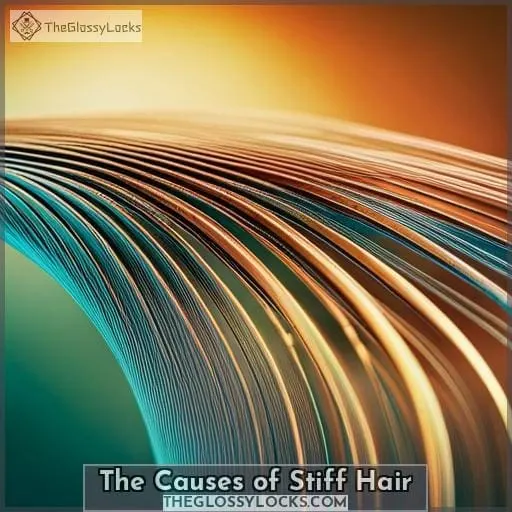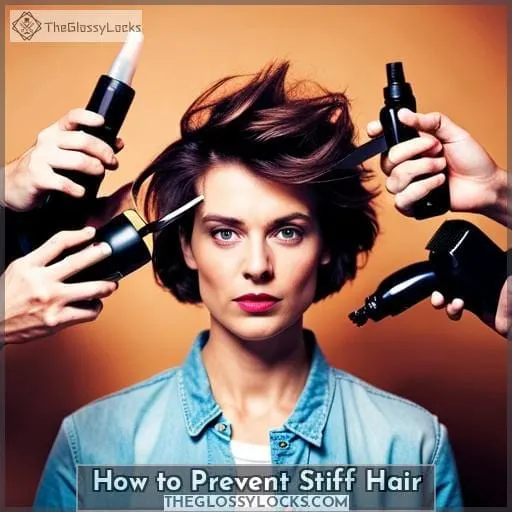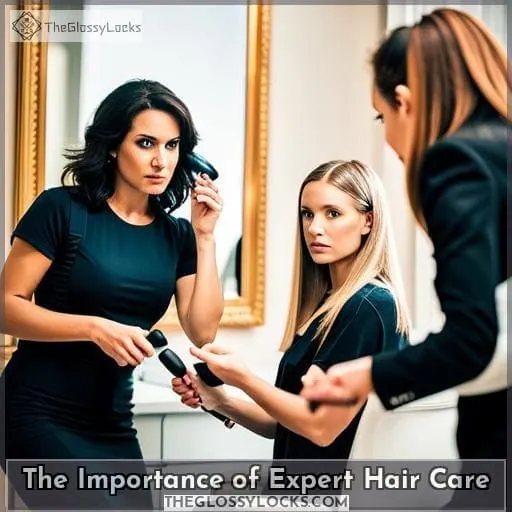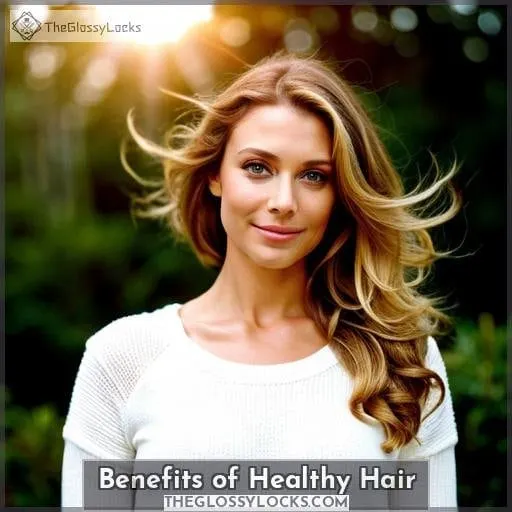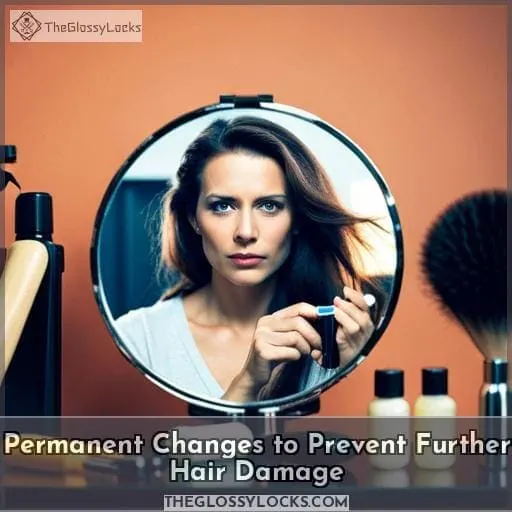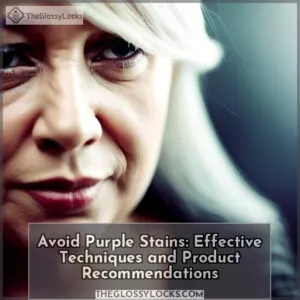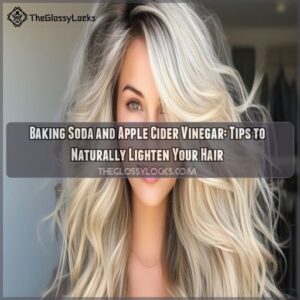This site is supported by our readers. We may earn a commission, at no cost to you, if you purchase through links.
Do you ever feel like your hair is so stiff it could be made of steel? You’re not alone. Millions of people around the world have experienced this problem, and luckily, there are ways to combat it. In order to understand why our hair can become stiff as a board, we need to first look at some common causes and then move on from there.
Table Of Contents
Key Takeaways

Stiff hair can be caused by heat or chemical damage, environmental factors, buildup on strands, and using too much protein in hair care. Prevention and treatment options include regular trimming, heat protection, deep conditioning, wearing a hat or using an umbrella, clarifying treatments, using natural oils or homemade hair masks, hydrating protein treatments, washing hair less frequently, using a cleansing conditioner, switching up hair products, limiting exposure to heat styling tools and chemical treatments, and seeking professional advice.
Natural remedies such as egg wash and mineral oil can help restore moisture to hair, while healthy styling techniques and avoiding chemical treatments can prevent further damage.
The Causes of Stiff Hair
Are you wondering why your hair has become so stiff? There are several potential causes that can contribute to this problem, such as heat or chemical damage, environmental factors like pollution and sunlight, buildup on strands from hard water or hair products blocking moisture from reaching the shafts of hair.
Furthermore, using too much protein in a hair care regimen can also make strands feel brittle and stiff.
Heat or Chemical Damage
Heat or chemical damage can leave your hair feeling dry and stiff, so it’s important to take extra care when using heat styling tools and chemical treatments. Regular trimming, heat protection with high-quality products, and avoidance of harsh chemicals are all key steps to protect against stiffness.
Deep conditioning is essential for restoring moisture levels and protein balance. Applying a moisturizing conditioner after shampooing helps ensure hair remains soft even after blow-drying or straightening with a flat iron.
It’s also important to invest in a good quality thermal spray to help safeguard strands from the damaging effects of heat styling tools.
Environmental Factors
Environmental factors such as toxic pollution, sun exposure, hard water, and saltwater can all contribute to dry and stiff hair. To protect your locks from these elements, consider wearing a hat or using an umbrella.
Hard water buildup can prevent moisture from reaching your hair, so it’s recommended to use a clarifying treatment weekly to reset strands. Additionally, it’s best to avoid using too much protein in your haircare regimen as it can leave strands feeling brittle.
Buildup on Strands
Your hair is likely feeling dry and stiff due to the buildup of products that are weighing it down. To prevent this, try using natural oils as a moisturizer or creating your own homemade hair masks with ingredients like avocado, banana, honey, and olive oil.
If your strands need more intensive help, opt for hydrating protein treatments or egg wash at least once a month to restore moisture in the cuticles. Additionally, monthly clarifying treatments can help reset strands by removing stubborn buildup from saltwater and hard water deposits.
By taking these steps towards healthy hair care practices, you will be able to achieve softness without sacrificing shine!
Using Too Much Protein in Haircare Regimen
Overusing protein in your hair care regimen can leave you feeling like a porcupine. So, be sure to use products with natural oils and alternate between protein-rich treatments and deep conditioning. Too much of one or the other will make hair stiff, dry, and brittle. Heat protection is also important when styling.
Opt for cool water rinses instead of hot showers to prevent further damage from heat exposure. Additionally, regular clarifying treatments are key for removing buildup from saltwater deposits or hard water minerals that could lead to split ends.
A consistent routine should include at least two deep conditionings a month with heat as well as monthly trims if necessary.
How to Prevent Stiff Hair
Are you wondering why your hair has become so stiff? If so, there are a few steps you can take to help prevent it. First, try washing your hair less frequently and deep conditioning weekly. You should also consider changing up the products that you use on your strands.
Incorporating a clarifying shampoo into your routine helps reset them by removing any buildup from hard water or product residue.
Wash Hair Less Frequently
By washing your hair less frequently, you can help restore moisture and reduce stiffness from buildup on strands. Regular shampooing strips away natural oils and proteins that keep it healthy, while deep conditioning treatments with heat give back some of what has been lost.
To maintain a balanced protein level in the hair shafts, try using a cleansing conditioner instead of regular shampoo every other wash. Heat protection is also key to keeping your locks soft. Avoid styling tools such as blow-dryers or curling irons if possible.
If you’re exposed to salt water or chlorine in swimming pools often, clarifying treatments are essential for resetting strands after each exposure.
Deep Condition Hair Weekly
Treating your hair to a weekly deep conditioning session will help replenish lost moisture, leaving it feeling soft as silk.
- Achieving protein balance is essential for healthy hair.
- Use chlorine protection before and after swimming in pools.
- Trimming technique can reduce split ends that make the condition of your hair dry and stiff.
Regular shampooing strips away natural oils, so opt instead for cleansing conditioners with a higher concentration of reparative ingredients.
With these easy-to-follow guidelines, you’ll have long-lasting, beautiful-looking strands in no time!
Change Up Hair Products
Switching up your hair products can help balance the protein levels in your locks, while protecting them from environmental damage. Consider using a blow dryer with no heat or curling irons on low settings to cut down sun exposure and product buildup.
Opt for alternatives that replenish protective oils and avoid heavy protein treatments, as these could lead to split ends.
Evergreen Beauty College salons in Washington State offer expert advice on finding the right product for you! With careful consideration of what works best with your individual hair type, you’ll be well-equipped to keep strands healthy and hydrated without sacrificing style or texture!
Do a Clarifying Treatment
Regularly performing a clarifying treatment can help reduce product buildup and reset your hair strands, which are essential components of keeping locks healthy. The International Society for Hair Restoration Surgery reports that up to 94% of women report regular scalp treatments improve overall hair health.
Detoxifying masks, natural oils, protein treatments, and heat protection are some methods to keep strands from stiffening due to harsh styling or environmental damage. Kenneth Byrd and his wife team at Curl Centric promote healthy haircare practices on their website.
Prevent Heat and Chemical Damage
To keep your hair looking and feeling its best, limit exposure to heat styling tools and chemical treatments. Detoxifying masks, deep conditioning with natural oils, protein balance treatments for strength and structure restoration, and heat protection are essential components of healthy strands.
Hair trimming is also important as split ends can cause a significant level of damage that creates large holes in the cuticle layer at different locations on the strand – one of the first signs of heat or chemical damage.
Specialty Applications for Extremely Damaged Hair
If your hair is severely damaged, you may need to try specialty treatments like egg wash, mineral oil, and expert help from Evergreen Beauty College salons to restore its health.
Egg wash is a natural remedy for dryness that helps add shine and strength back into the hair strands. Mineral oil can be used as an overnight treatment and will leave your locks feeling softer in the morning.
Heat treatments are also necessary when trying to revive extremely damaged locks. They open up cuticles on each strand in order for product or moisture to penetrate more deeply than before.
Expert advice from professionals at beauty college locations should be sought out if long-term changes must take place. This could include using different products or protective styles that won’t damage delicate strands further down the line.
With these measures taken care of, stiff tresses will become manageable again with glossy results!
The Importance of Expert Hair Care
Taking care of your hair is essential to maintain its luster and shine, so don’t underestimate the importance of professional help. When it comes to choosing products, treatments, or heat styling tools for your hair, you should always seek advice from a qualified expert.
Those with years of experience in the industry can provide valuable insight into which products will best suit your individual needs and how often they should be used for maximum protection. They may also recommend special treatments such as egg washes or mineral oils that could improve dryness and restore protective oils lost through normal practices like shampooing too frequently or using harsh chemicals on the hair.
Professional advice helps ensure that you are looking after your locks correctly while avoiding further damage due to incorrect use of products, heat styling tools, or hair treatments.
Benefits of Healthy Hair
Having healthy hair is a good sign that your scalp and strands are in great condition. Healthy hair has the natural ability to be glossy, silky, and easy-to-manage. One of the most common causes of stiff strands is not taking proper care of them.
This means skipping on nutrition for your scalp as well as heat protection or having an ineffective haircare routine with unsuitable products.
Investing in a more healthy alternative like quality shampoos free from sulfates or parabens and clarifying treatments that help reset dryness buildup caused by hard water or harsh chemical products we use too often is the best way to keep our mane looking its best.
Permanent Changes to Prevent Further Hair Damage
To maintain healthy hair, permanent changes may be necessary to prevent further damage. It’s important to practice preventative hair care by using healthy styling techniques and avoiding chemical treatments that can cause serious damage.
Try different small-scale changes, such as a mixture of egg, yogurt, honey, or olive oil, for best results. Eating nutritious food also helps keep your scalp nourished and hydrated, promoting stronger, healthier hair growth over time.
Furthermore, it’s important to avoid shampooing too often, as this strips the hair of its natural protective oils needed for moisture retention.
Frequently Asked Questions (FAQs)
How often should I shampoo my hair?
Shampoo your hair less often to maintain its natural oils and allow it to retain a glossy shine. Deep condition weekly for maximum moisture, and use clarifying shampoos periodically to remove stubborn buildup.
What is the best way to protect my hair from the sun?
Wear a hat or carry an umbrella when in the sun to keep your hair protected. Use leave-in conditioner for extra protection and try to air dry or blow dry on no heat. Avoid chemical treatments, bleaching, and saltwater swimming as much as possible.
How can I tell if I am using too much protein in my haircare regimen?
If your hair feels dry and stiff, it may be due to an excess of protein in your hair care routine.
Are there any treatments that can help repair my hair?
Yes, there are treatments that can help repair your hair! Leave-in conditioners, egg washes, and mineral oil are all effective in restoring your hair’s moisture. For severely damaged hair, expert care from an Evergreen Beauty College salon may be necessary.
What are the benefits of a professional trim?
Getting a professional trim can yield many benefits for your hair. It will help you maintain healthy, glossy locks that are easy to manage and style. A trim removes split ends, reduces damage from heat and chemicals, and keeps the hair looking fresh.
Conclusion
Having healthy hair doesn’t just make you look good, it also has a host of benefits. Stiff hair can be caused by heat or chemical damage, environmental factors, or buildup from hair products. To prevent stiff hair, you should wash it less frequently, deep condition it weekly, change up your hair products, and do a clarifying treatment.
If your hair is extremely damaged, there are specialty applications that can help restore its moisture. Ultimately, it’s important to turn to an expert for the best advice and treatments for your hair.
Just like you wouldn’t try to fix your car without consulting a mechanic, you shouldn’t attempt major changes to your hair without the help of a professional.

